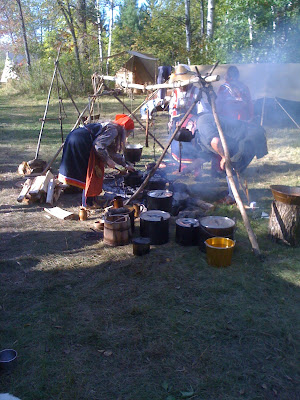There's a small museum in the visitor center where you can explore the history of the fur trade.

 And when you step outside, you leave 2010 and travel back in time to 1804...
And when you step outside, you leave 2010 and travel back in time to 1804... Our tour guide, the French Canadian voyageur, explained the ins and outs of the fur trade. The hottest commodity was beaver, which was used to make stately top hats.
Our tour guide, the French Canadian voyageur, explained the ins and outs of the fur trade. The hottest commodity was beaver, which was used to make stately top hats. We then learned a little bit about the Ojibwe encampment while hanging out in a tipi.
We then learned a little bit about the Ojibwe encampment while hanging out in a tipi. And met a navigator, who explained his role within the process.
And met a navigator, who explained his role within the process. Later, we encountered Mr. John Sayer, a partner with North West Company and head of the crew.
Later, we encountered Mr. John Sayer, a partner with North West Company and head of the crew. Then we toured the shop, where the Ojibwe came to trade their furs for blankets and other goods.
Then we toured the shop, where the Ojibwe came to trade their furs for blankets and other goods. We got to see where Mr. Sayer and his family live.
We got to see where Mr. Sayer and his family live. And then we headed to the camp, where people (hobbyists who travel to these type of events, placing themselves back in the early 19th century) were playing music, selling goods and making their own grub.
And then we headed to the camp, where people (hobbyists who travel to these type of events, placing themselves back in the early 19th century) were playing music, selling goods and making their own grub.
 I bought this adorable, hand-painted little bowl (so far, it sits all pretty-like on a shelf and sometimes holds very important things like chocolate candies - any suggestions for other purposes are welcome).
I bought this adorable, hand-painted little bowl (so far, it sits all pretty-like on a shelf and sometimes holds very important things like chocolate candies - any suggestions for other purposes are welcome). As we toured the camp, we found children working...
As we toured the camp, we found children working... And strapping young lads hauling water.
And strapping young lads hauling water.

